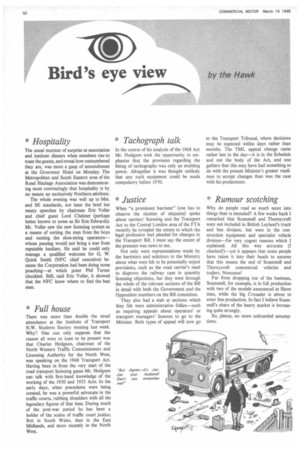Bird's eye view by the Hawk
Page 54

If you've noticed an error in this article please click here to report it so we can fix it.
* Hospitality
The usual murmur of surprise at association and institute dinners when members rise to toast the guests, and reveal how outnumbered they are, was more a gasp of astonishment at the Grosvenor Hotel on Monday. The Metropolitan and South Eastern area of the Road Haulage Association was demonstrating most convincingly that hospitality is by no means an exclusively Northern attribute.
The whole evening was well up to Met. and SE standards, not least the brief but meaty speeches by chairman Eric Voller and chief guest Lord Chelmer (perhaps better known to some as Sir Eric Edwards). Mr. Voller saw the new licensing system as a means of sorting the men from the boys and ousting the shoe-string operators— whose passing would not bring a tear from reputable hauliers. He said he could only manage a qualified welcome for G. W. Quick Smith (NFC chief executive) because the Corporation had been doing some poaching—at which point Phil Turner chuckled. Still, said Eric Voller, it showed that the NFC knew where to find the best men.
* Full house
There was more than double the usual attendance at the Institute of Transport N.W. Students Society meeting last week. Why? One can only suppose that the reason all were so keen to be present was that Charles Hodgson, chairman of the North Western Traffic Commissioners and Licensing Authority for the North West, was speaking on the 1968 Transport Act. Having been in from the very start of the road transport licensing game Mr. Hodgson can talk with first-hand knowledge of the working of the 1930 and 1933 Acts. In the early days, when precedents were being created, he was a powerful advocate in the traffic courts, rubbing shoulders with all the legendary figures of that time. During much of the post-war period he has been a holder of the scales of traffic court justice, first in South Wales, then in the East Midlands, and more recently in the North West.
* Tachograph talk
In the course of his analysis of the 1968 Act Mr. Hodgson took the opportunity to emphasize that the provision regarding the fitting of tachographs was only an enabling power. Altogether it was thought unlikely that any such equipment could be made compulsory before 1970.
* Justice
When -a prominent barrister" (one has to observe the niceties of etiquette) spoke about carriers' licensing and the Transport Act to the Central London area of the FTA recently he revealed the extent to which the legal profession had pleaded for changes in the Transport Bill. I must say the extent of the pressure was news to me.
Not only were representations made by the banisters and solicitors to the Ministry about what were felt to be potentially unjust provisions, such as the road carrier's need to disprove the railway case in quantity licensing objections, but they went through the whole of the relevant sections of the Bill in detail with both the Government and the Opposition members on the Bill committee.
They also had a stab at sections which they felt were administrative follies—such as requiring appeals about operators' or transport managers' licences to go to the Minister. Both types of appeal will now go to the Transport Tribunal, where decisions may be expected within days rather than months. The TML appeal change came rather late in the day—it is in the Schedule and not the body of the Act, and one gathers that this may have had something to do with the present Minister's greater readiness to accept changes than was the case with his predecessor.
* Rumour scotching
Why do people read so much more into things than is intended? A few weeks back I remarked that Scammell and Thornycroft were not included in British Leyland's truck and bus division, but were in the construction equipment and specialist vehicle division—for very cogent reasons which I explained. All this was accurate (I checked!)—yet it appears that some people have taken it into their heads to assume that this means the end of Scammell and Thornycroft commercial vehicles and trailers. Nonsense!
Far from dropping out of the business, Scammell, for example, is in full production with two of the models announced at Show time, while the big Crusader is about to enter line production. In fact I believe Scammell's share of the heavy market is increasing quite strongly.
So, please, no more unfounded assumptions.




















































































































